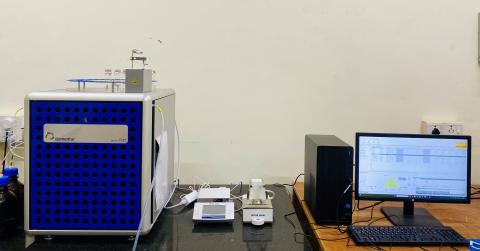| |
|
Total Organic Carbon Analyser (TOC)
 Kindly download
Material Safety Data
sheet
and submit the hardcopy of filled sheet along with your sample
Kindly download
Material Safety Data
sheet
and submit the hardcopy of filled sheet along with your sample
|
|
|
Make
|
: Elementar, Germany
|
|
Model
|
: Enviro TOC
|
|
Date of Installation
|
: 6th January, 2025
|
|
Facilty Description
|
: Estimation of Total
Organic Carbon (TOC) in water, solid, and other
samples, and
Bound Nitrogen (TNb at ppm
level)
|
|
 |
|
|
• The TOC measuring principle of
the enviro TOC is based on catalytic high-temperature
combustion of the sample in an oxygen stream (for liquid – 850°C & for solid –
950°C).
• Under these conditions, all
bound and dissolved carbon is oxidized to CO₂, which is
determined quantitatively with an IR detector.
• Sample pre-treatment steps,
e.g. for removing the inorganic carbon from the sample,
are fully automated. The TOC analysis provides easily evaluable results since matrix
effects are negligible and the carbon concentration in the sample correlates
linearly with the CO₂ signal.
• In comparison to other
techniques for the determination of organic contamination,
the use of hazardous substances is avoided and the analysis time is only a few
minutes.
|
1) Pure Samples: Samples
should be free of contamination.
2) Sample
Volume/Weight:
Liquids: 50–60
ml for water samples.
Solids: 0.1–1.0
gm finely ground or powdered.
3) Handling: Ensure
uniform
consistency for liquids and filtration if necessary.
|
Contact: 022-2159 6884
Email ID: toc.saif@csif.iitb.ac.in, bharati@iitb.ac.in
|
|
TOC analyser (Charges excluding GST)
|
|
University
|
National Lab
/ R&D's
|
Industry
|
IIT Bombay
Users
|
Remarks
|
|
TIC + TOC
(Liquid Sample)
|
600 /-
|
1500 /-
|
3000 /-
|
300 /-
|
Per Sample
|
|
TIC + TOC + TNb
(Liquid Sample)
|
900 /-
|
2700 /-
|
4500 /-
|
450 /-
|
Per Sample
|
|
TC (Solid
Sample)
|
600 /-
|
1500 /-
|
3000 /-
|
300 /-
|
Per Sample
|
|
|
• Environmental Monitoring:
Environmental monitoring (e.g., water quality in lakes, rivers).
• Wastewater Treatment:
Wastewater treatment processes and management.
• Drinking Water Analysis:
Analysis of drinking water for safety and compliance.
• Industrial Applications:
Industrial applications (e.g., pharmaceuticals, chemicals).
• Research and Quality Control:
For research and quality control purposes.
|
